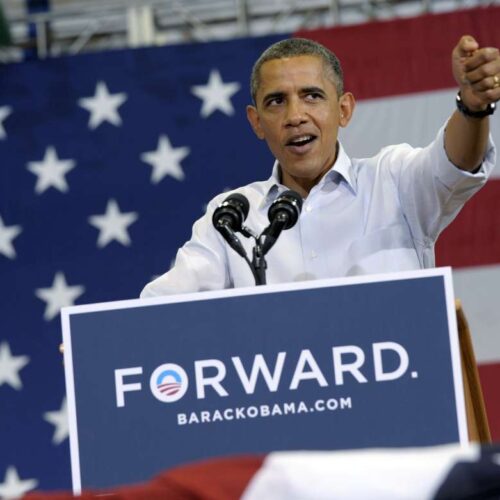Introduction
WASHINGTON (AP) — President Barack Obama’s campaign has spent nearly $100 million on television commercials in selected battleground states so far, unleashing a sustained early barrage designed to create lasting, negative impressions of Republican Mitt Romney before he and his allies ramp up for the fall.
In a reflection of campaign strategy, more than one-fifth of the president’s ad spending has been in Ohio, a state that looms as a must-win for Romney more so than for Obama. Florida ranks second and Virginia third, according to organizations that track media spending and other sources.
About three-quarters of the president’s advertising has been critical of Romney as Obama struggles to turn the election into a choice between him and his rival, rather than a referendum on his own handling of the weak economy. Obama’s television ad spending dwarfs the Romney campaign’s so far by a margin of 4-1 or more. It is at rough parity with the Republican challenger and several outside GOP-led organizations combined. They appear positioned to outspend the president and his allies this fall, perhaps heavily.
The latest attack ad, which began airing Friday, accuses the Republican of favoring a 25 percent tax cut for millionaires, tax breaks for oil companies and corporations that move jobs overseas and a tax increase for working families. By contrast, it says, the president wants “the wealthy to pay a little more so the middle class pays less.”
Democrats and even some Republicans agree the effort to cast Romney as an unfit steward for the economy shows sign of making some headway. Yet GOP strategists hasten to add that the former Massachusetts governor has ample time to counter, particularly with recent signs of a struggling economy and the fall campaign yet to begin.
“Despite all of the negative advertising from the Obama campaign, polling numbers are exactly where they were before they started this onslaught,” the Romney campaign said in a memo distributed this week, referring to a rolling average of polls.
Yet Romney released a scathing ad on Thursday designed to respond to some of Obama’s charges, the sort of rebuttal that often can signal concern that an attack is hitting home. In 2008, “candidate Obama lied about Hillary Clinton,” the ad said, adding there was no truth to the charges that Romney was associated with companies that outsourced jobs.
Some surveys suggest shifts in the electoral landscape. A recent poll by Pew Research Center for the People and the Press found that Romney has lost ground in the past month on the question of which candidate was better able to improve the economy.
“They wanted to define Romney before he could define himself, and by every indication they’re doing a very effective job of that” said Jim Jordan, a Democratic strategist who was campaign manager for Democratic presidential candidate John Kerry in 2004.
According to strategists in both parties, focus groups with voters indicate the public knows relatively little about Romney’s background, making the subject generally fertile territory for anyone trying to create an impression.
Romney has twice run for president. But even in this year’s Republican primaries, his own campaign spent less money on television ads than Restore Our Future, a superPAC that aided him. Most of the outside group’s efforts consisted of attacks on Romney’s GOP rivals, rather than testimonials to his own background and character.
While outside groups make a difference, “what campaigns said about the candidates is the most important thing” in a race, said Terry Nelson, a Republican strategist who had a senior position in President George W. Bush’s re-election campaign.
Another Republican strategist, speaking on condition of anonymity to avoid offending the campaign, said Obama’s commercials attacking Romney are quickly defining him and the strategy is effective.
But Carl Forti, one of the strategists involved with Restore Our Future, said Obama’s strategy is more defensive than it might appear.
“I don’t think he’s got a choice. He has to try to change the dynamic now, but the polling indicates it’s not working. He doesn’t appear to be making any headway in the polls,” he said.
There is no dispute about the intensity of the general election ad wars, which began in April with Rick Santorum’s withdrawal from the race for the Republican nomination.
“There are more advertisers in fewer markets, spending more money and advertising at a higher frequency than in previous elections,” said Elizabeth Wilner, vice president of Kantar Media/CMAG, which monitors advertising.
Wilner said viewers in Columbus, Ohio, “are seeing more ads right now than they were seeing in September of 2008,” a period when campaigns traditionally ramp up for the fall. In Iowa, more money has been spent on television ads per electoral vote than in all of 2008, she added.
Obama’s campaign has launched four commercials this month, including the attack ad that began during the day.
Two others accuse Romney of having ties to companies that outsource U.S. jobs to low-wage countries overseas. The final one says the former governor supported a law to ban all abortions, including in cases of rape and incest, and wants to end federal funding for Planned Parenthood.
Ads in Ohio, Florida and Virginia account for roughly half of the Obama’s campaign ad spending, according to records maintained by groups that track spending and other sources. No Republican has ever been elected president without winning Ohio, and Romney’s chances of a victory would be all but extinguished if the president wins either of the two other states.
The Obama campaign also has advertised in Colorado, Iowa, Nevada, New Hampshire, North Carolina and Pennsylvania, on both broadcast and local cable. In some of those states, it has run Spanish-language commercials.
Read more in Money and Democracy
Money and Democracy
Daily Disclosure: RNC spends $5.1 million against Obama
Anti-Obama ad buy targets battleground states
Money and Democracy
Green Party nominee rails against ‘corporate rule’
Activist fights to amend constitution

Join the conversation
Show Comments